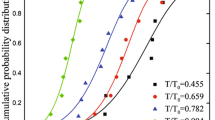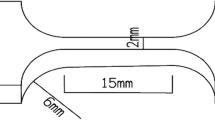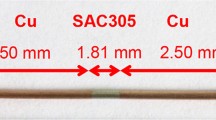Abstract
In this paper, effect of hold time on the low cycle mechanical fatigue failure behavior of Sn3.0Ag0.5Cu solder joint was investigated. Fatigue tests were conducted utilizing trapezoid waveform with four hold times (0, 2, 5, 10 s) under 348 K. The results show that samples tested under waveform with hold time has the faster maximum stress drop rate comparing to that without hold time. Accordingly, the fatigue life of solder joint is declined with increasing hold time. However, there exists a threshold value, and when the hold time exceeds this value, the fatigue life changes little. Stress relaxation occurs during the hold time, which is completed in a short time under high temperature. Deformation of the solder joint is not uniform, which is concentrated in the solder matrix near the substrate. Micro crack initiates at the corner of the solder joint and propagates in the strain concentrated zone with a direction parallel to the applied load. In addition, Creep voids are observed from the fracture morphology of solder joints tested with hold time, which nucleate at the slip bands and the dendrite boundary tensile ledges. Moreover, the fracture morphology appears an inter-granular rupture mode. However, for solder joints tested without hold time, the rupture mode is trans-granular with some dimples dispersed on the morphology.








Similar content being viewed by others
References
T. Goswami, H. Hanninen, Mater. Des 22, 199–215 (2001)
T. Goswami, H. Hanninen, Mater. Des 22, 217–236 (2001)
K. Tanaka, Eng. Fract. Mech 77, 1750–1762 (2010)
K.J. Lau, C.Y. Tang, P.C. Tse, Int. J. Fract 130, 617–634 (2004)
Y. Kanda, Y. Kariya, Y. Mochizuki, Mater. Trans 49, 1524–1530 (2008)
Y. Kanda, Y. Kariya, J. Electron Mater 39, 238–245 (2010)
W.R. Jong, H.C. Tsai, H.T. Chang et al., J. Electron Packag 130, 1–10 (2008)
K.O. Lee, J. Yu, T.S. Park, S.B. Lee, J. Electron Mater 33, 249–257 (2004)
Y. Kariya, Y. Kanda, K. Iguchi et al., Mater. Trans 51, 1779–1784 (2010)
E.W. Hare, J. Electron Mater 24, 1473–1484 (1995)
R. Hales, Fatigue Eng. Mater. Struct 6, 121–135 (1983)
W.M. Payten, D.W. Dean, K.U. Snowden, Mater. Sci. Eng. A 527, 1920–1925 (2010)
M.R. Lin, M.E. Fine, T. Mura, Acta Metall 34, 619–628 (1986)
Y.X. Zhu, X.Y. Li, C. Wang, R.T. Gao, J. Mater. Sci. Mater. Electron 25, 1429–1434 (2014)
H. Riedel, Fracture at high temperatures (Springer, Heidelberg, 1987), pp. 57–84
H.E. Evans, Mechanisms of creep fracture (Elsevier, London, 1984), pp. 25–27
Y. Kanda, Y. Kariya, Y.J. Oto, J. Electron Mater 41, 580–587 (2012)
M. Reid, F. Punch, M. Collins et al., Solder. Surf. Mt. Tech 20, 3–8 (2008)
R. Raj. ASM materials science seminar. (Philadelphia, 1983), pp. 215–249
Acknowledgments
This study was financially supported by National Natural Science Foundation of China (No. 51275007) and Key Project of Beijing Educational Committee Scientific Research Plan (No. KZ201410005009), which were acknowledged.
Author information
Authors and Affiliations
Corresponding author
Rights and permissions
About this article
Cite this article
Zhu, Y., Li, X., Gao, R. et al. Effect of hold time on the mechanical fatigue failure behavior of lead-free solder joint under high temperature. J Mater Sci: Mater Electron 25, 3863–3869 (2014). https://doi.org/10.1007/s10854-014-2100-2
Received:
Accepted:
Published:
Issue Date:
DOI: https://doi.org/10.1007/s10854-014-2100-2




